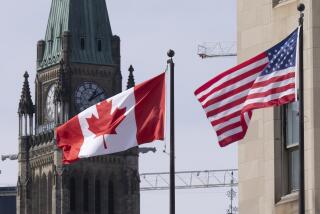Words of Caution on Travel Abroad
- Share via
In the wake of recent threats of reprisals by terrorists for U.S. military actions in Sudan and Afghanistan, the American Automobile Assn. is urging travelers to be extra cautious while visiting abroad or passing through airports in the United States.
For travel abroad, AAA offers the following tips:
* Review your travel, homeowner, automobile and medical insurance policies to determine coverage for trip cancellation, interruption, loss, theft, accident or injury while overseas. If necessary, consider additional coverage.
* Make photocopies of the identification page of your passport and credit cards, a list of your travelers check numbers and a copy of your itinerary, and leave them home with someone you can reach by phone. Pack an extra copy with spare passport photos for yourself if needed while traveling.
* Confirm your itinerary a few days before departure and before any flights en route.
* Familiarize yourself with local customs and political differences to avoid offensive behavior, inappropriate dress or breaking the law. Avoid slang and humor that could be misinterpreted.
* Buy an International Driving Permit which, while not required in all countries, translates key identification information into eight languages. The permits cost $10 at AAA offices.
* Obtain AAA’s “Offices to Serve You Abroad” booklet. Plan to visit AAA’s reciprocal foreign motor clubs for travel information, reservations or itinerary changes.
* Keep your distance from stray luggage and packages left unattended in airports and other public places.
* Invest in a detailed local map and prominently mark your hotel, office, friendly embassies, police stations and fire departments.
* Use hotel and airport taxis. Avoid those that pick up additional people en route.
* Ask a hotel representative which streets and neighborhoods to avoid.
* Dress conservatively. Avoid standing out as a tourist or touting your nationality or wealth.
* Don’t discuss travel plans openly in public locations.
* Avoid confrontation. Don’t engage in conversations on potentially sensitive subjects.
* Refrain from photographing natives, police, military installations and personnel or industrial structures unless you’re sure it will not alarm anyone or break a law.
* If you have any problems or uneasiness at your destination, visit the American or Canadian embassy to register your itinerary and hotel address.
In a “worldwide caution” the U.S. Department of State has urged Americans traveling or residing abroad to “review their security practices, to remain alert to the changing situation and to exercise much greater caution than usual.” American Embassy operations have been suspended in several countries, including Somalia, Sudan, Congo-Brazzaville, the Democratic Republic of Congo and Guinea-Bissau.
Travelers abroad should contact the nearest U.S. embassy or consulate by telephone or fax for up-to-date information on security conditions. Information is also available on the internet at https://travel.state.gov. In the United States, call (202) 647-5225 for recorded information from the Department of State.
Source: American Automobile Assn.; Researched by LINN GROVES / For The Times
More to Read
Sign up for The Wild
We’ll help you find the best places to hike, bike and run, as well as the perfect silent spots for meditation and yoga.
You may occasionally receive promotional content from the Los Angeles Times.






